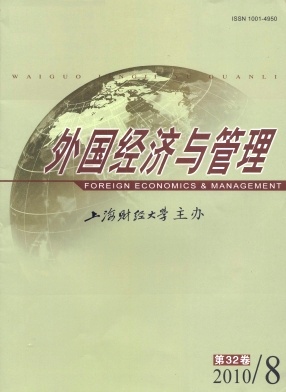个性化契约研究述评与展望
外国经济与管理 2010 年 第 32 卷第 08 期, 页码:58 - 65
摘要
参考文献
摘要
目前,个性化契约已成为雇佣关系研究领域的一个新的研究方向。个性化契约是能够满足现代组织中员工和雇主双方利益的工作安排。本文从概念、测量以及影响因素和影响结果等方面述评了个性化契约的研究现状,并对未来该领域的研究方向进行了展望。
[1]Rousseau,D M.I-deals:Idiosyncratic deals employees bargain for themselves[M].New York:Sharpe,2005.
[2]Greenberg,J,Roberge,ME,Ho,V T,and Rousseau,D M.Fairness inidiosyncratic work arrangements:Justice as ani-deal[A].in J J Martocchio(Ed.).Researchin personnel and human resources management(vol.23)[C].Greenwich,CT:Elsevier Science/JAI Press,2004:1-34.
[3]Hornung,S,Rousseau,D M,Glaser,J,Angerer,P,and Weigl,M.Beyondtop-down and bottom-up work redesign:Custom-izing job content throughidiosyncratic deals[J].Journal of Organizational Behavior,2010,31(2):187-215.
[4]Lester,S W,Turnley,W H,Bloodgood,J M,and Bolino,MC.Not seeing eye to eye:Differences in supervisor and subordi-nate perceptions of and attributions for psychological contract breach[J].Journal of Organizational Behavior,2002,23(1):39-56.
[5]Hornung,S,Rousseau,D M,and Glaser,J.Why supervisors make idiosyncratic deals:Antecedents and outcomes of i-dealsfroma managerial perspective[J].Journal of Managerial Psychology,2009,24(8):738-764.
[6]Hornung,S,Rousseau,D M,and Glaser,J.Creating flexible work arrangements through idiosyncratic deals[J].Journal ofApplied Psychology,2008,93(3):655-664.
[7]Rousseau,D M,Hornung,S,and Ki m,T G.Idiosyncratic deals:Testing propositions onti ming,content,andthe employmentrelationship[J].Journal of Vocational Behavior,2009,74(3):338-348.
[8]Rousseau,D M.Idiosyncratic deals:Flexibility versus fairness?[J].Organizational Dynamics,2001,29(4):260-271.
[9]李原,郭德俊.组织中的心理契约[J].心理科学进展,2002,10(1):83-90.
[10]Turnley,W H,and Feldman,D C.I mpact of psychological contract violations on exit,voice,loyalty,and neglect[J].HumanRelations,1999,52(7):895-922.
[11]Rousseau,D M,Ho,V T,and Greenberg,J.I-deals:Idiosyncratic terms in employment relationships[J].Academy of Man-agement Review,2006,31(4):977-994.
[12]Ng,T W H,and Feldman,D C.Idiosyncratic deals and organizational commit ment[J].Journal of Vocational Behavior,2010,76(3):419-427.
[13]Posthuma,R A,and Campion,MA.Age stereotypesinthe workplace:Common stereotypes,moderators,andfuture researchdirections[J].Journal of Management,2009,35(1):158-188.
[14]Lai,L,Rousseau,D M,and Chang,K T T.Idiosyncratic deals:Coworkers as interested third parties[J].Journal of AppliedPsychology,2009,92(2):547-556.
[15]罗耀平,范会勇,张进辅.工作—家庭冲突的前因、后果及干预策略[J].心理科学进展,2007,15(6):930-937.
[16]Knippenberg,D V,and Sleebos,E.Organizational identification versus organizational commit ment:Self-definition,social ex-change,and job attitudes[J].Journal of Organizational Behavior,2006,27(5):571-584.
[17]Tsui,A S.Contextualizationin Chinese management research[J].Management and Organization Review,2006,2(1):1-13.
[18]Chen,C C.Newtrends in rewards allocation preferences:A SI NO-U.S.comparison[J].Academy of Management Journal,1995,38(2):408-428.
[2]Greenberg,J,Roberge,ME,Ho,V T,and Rousseau,D M.Fairness inidiosyncratic work arrangements:Justice as ani-deal[A].in J J Martocchio(Ed.).Researchin personnel and human resources management(vol.23)[C].Greenwich,CT:Elsevier Science/JAI Press,2004:1-34.
[3]Hornung,S,Rousseau,D M,Glaser,J,Angerer,P,and Weigl,M.Beyondtop-down and bottom-up work redesign:Custom-izing job content throughidiosyncratic deals[J].Journal of Organizational Behavior,2010,31(2):187-215.
[4]Lester,S W,Turnley,W H,Bloodgood,J M,and Bolino,MC.Not seeing eye to eye:Differences in supervisor and subordi-nate perceptions of and attributions for psychological contract breach[J].Journal of Organizational Behavior,2002,23(1):39-56.
[5]Hornung,S,Rousseau,D M,and Glaser,J.Why supervisors make idiosyncratic deals:Antecedents and outcomes of i-dealsfroma managerial perspective[J].Journal of Managerial Psychology,2009,24(8):738-764.
[6]Hornung,S,Rousseau,D M,and Glaser,J.Creating flexible work arrangements through idiosyncratic deals[J].Journal ofApplied Psychology,2008,93(3):655-664.
[7]Rousseau,D M,Hornung,S,and Ki m,T G.Idiosyncratic deals:Testing propositions onti ming,content,andthe employmentrelationship[J].Journal of Vocational Behavior,2009,74(3):338-348.
[8]Rousseau,D M.Idiosyncratic deals:Flexibility versus fairness?[J].Organizational Dynamics,2001,29(4):260-271.
[9]李原,郭德俊.组织中的心理契约[J].心理科学进展,2002,10(1):83-90.
[10]Turnley,W H,and Feldman,D C.I mpact of psychological contract violations on exit,voice,loyalty,and neglect[J].HumanRelations,1999,52(7):895-922.
[11]Rousseau,D M,Ho,V T,and Greenberg,J.I-deals:Idiosyncratic terms in employment relationships[J].Academy of Man-agement Review,2006,31(4):977-994.
[12]Ng,T W H,and Feldman,D C.Idiosyncratic deals and organizational commit ment[J].Journal of Vocational Behavior,2010,76(3):419-427.
[13]Posthuma,R A,and Campion,MA.Age stereotypesinthe workplace:Common stereotypes,moderators,andfuture researchdirections[J].Journal of Management,2009,35(1):158-188.
[14]Lai,L,Rousseau,D M,and Chang,K T T.Idiosyncratic deals:Coworkers as interested third parties[J].Journal of AppliedPsychology,2009,92(2):547-556.
[15]罗耀平,范会勇,张进辅.工作—家庭冲突的前因、后果及干预策略[J].心理科学进展,2007,15(6):930-937.
[16]Knippenberg,D V,and Sleebos,E.Organizational identification versus organizational commit ment:Self-definition,social ex-change,and job attitudes[J].Journal of Organizational Behavior,2006,27(5):571-584.
[17]Tsui,A S.Contextualizationin Chinese management research[J].Management and Organization Review,2006,2(1):1-13.
[18]Chen,C C.Newtrends in rewards allocation preferences:A SI NO-U.S.comparison[J].Academy of Management Journal,1995,38(2):408-428.
引用本文
杨柳, 贾自欣. 个性化契约研究述评与展望[J]. 外国经济与管理, 2010, 32(8): 58–65.
导出参考文献,格式为:
上一篇:电子商务研究前沿探析与未来展望





 8112
8112  596
596

